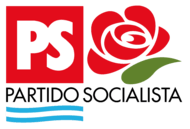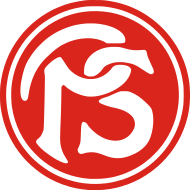Socialist Party (Argentina)
The Socialist Party (Spanish: Partido Socialista, PS) is a social-democratic political party in Argentina.[9][10]
Socialist Party Partido Socialista | |
|---|---|
 | |
| Abbreviation | PS |
| Leader | Antonio Bonfatti[1] |
| Founded | 28 June 1896 |
| Merger of | Democratic Socialist Party, Popular Socialist Party |
| Headquarters | Buenos Aires, Argentina |
| Membership (2012) | 124,934 (4th)[2] |
| Ideology | Social democracy[3]
Democratic socialism[4] Formerly: Socialism |
| Political position | Centre-left[5] |
| National affiliation | Federal Consensus[6] |
| Regional affiliation | COPPPAL[7] |
| International affiliation | Progressive Alliance[8] |
| Colors | Red |
| Seats in the Chamber of Deputies | 1 / 257
|
| Seats in the Senate | 0 / 72
|
| Seats in the Buenos Aires City Legislature | 2 / 60
|
| Province Governors | 0 / 24
|
| Website | |
| http://www.partidosocialista.org.ar/ | |
Founded in 1896, it is one of the oldest still-active parties in Argentina, alongside the Radical Civic Union.[11]
The party has been an opponent of Kirchnerism and Mauricio Macri.[12][13]
History
Early history
The history of socialism in Argentina began in the 1890s, when a group of people, notably Juan B. Justo, expressed the need for a greater social focus. The PS itself was founded in 1896, led by Justo and Nicolás Repetto, thus becoming the first mass party in the country. The party affiliated itself with the Second International.[14] Between 1924 and 1940 it was a member of the Labour and Socialist International.[15]
Through its life, the party suffered from various splits: the International Socialist Party (which became the Communist Party of Argentina) and the Independent Socialist Party were the most notable. The most important of those was in the 1960s, when the party divided itself in half, giving birth to the more radical Argentine Socialist Party (Partido Socialista Argentino, PSA), and the more moderate Democratic Socialist Party (Partido Socialista Democrático, PSD). In 1966, two factions departed the PSA: Vanguardia Comunista and Partido Socialista de Vanguardia. In 1972, the remaining of the PSA together with other leftist groups formed the Popular Socialist Party (Partido Socialista Popular, PSP). The PSP and PSD were rejoined in 2002, forming the Socialist Party.

Among the socialist leaders of Argentina, the most remarkable are Alfredo Palacios, who was the first socialist parliamentarian in the Americas (1904) and a Senator in the 1960s; Juan B. Justo, doctor, philosopher, writer and leader of the party until his death in 1928; Alicia Moreau de Justo (1895–1986), Justo's wife, who was for years the editor of the Socialist newspaper La Vanguardia; Guillermo Estévez Boero, founder of the Popular Socialist Party; and Alfredo Bravo, a teacher, unionist, human rights militant and respected legislator in the last two decades of the 20th century (died 2003).
The Socialist Party of Argentina maintains an electoral stronghold in the province of Santa Fe, and particularly in Rosario, where mayors have been socialists since 1989. Former two-term mayor Hermes Binner slowly became acknowledged as a reference character for the party. In the 2005 parliamentary elections a Socialist-Radical alliance led by Binner won 5 seats in the national Lower House, and in the elections of 2007 Binner, leading a broad, centre-leftist political coalition (the Progressive, Civic and Social Front), became the first Socialist to be elected governor of an Argentine province.[16]
Present day
In the 2011 General Elections, Binner was the Socialist candidate and achieved 2nd place with 16.8% of votes.[17] Despite this number being well below the 54.1% achieved by Peronist leader Cristina Fernández de Kirchner, the Socialist Party considered the results of the election as significant and a sign of renewed interest by a sector of the population.[18] In May 2012, Binner became the Socialist Party's president.[19]
For the 2015 general election, the PS entered in coalition with other centre-left and left-wing parties to form the Progresistas (Progressives) front, which endorsed Margarita Stolbizer for the presidency. Stolbizer landed 5th in the election with just over 2.5% of the vote, failing to pass the threshold for the run-off. During the same elections, Socialist Miguel Lifschitz was elected Governor of Santa Fe, succeeding Antonio Bonfatti (also of the PS).
In April 2016, Bonfatti was chosen to succeed Binner as national president of the party.[1] Following the 2017 legislative election, the party was left with a single national deputy, Luis Contigiani, and no representatives in the Senate. In 2018, Contigiani left the Socialist Party's bloc in the Chamber of Deputies after being criticized by his party for refusing to vote in favor of a bill that would legalize abortion in the country.[20][21]
In 2019 election PS didn't elect any deputies; however, socialist politician Enrique Estevez was elected to the Chamber of Deputies on the list of the Progressive, Civic and Social Front, and thus the Socialist Party regained its representation in the Congress.[22][23]
Electoral performance
President
| Election year | Candidate | Coalition | 1st round | ||
|---|---|---|---|---|---|
| # of overall votes | % of overall vote | ||||
| 1916 | Juan B. Justo | N/A | 52.215 (4th) | 7.25 (lost) | |
| 1922 | Nicolás Repetto | 54.813 (4th) | 6.61 (lost) | ||
| 1928 | Mario Bravo | 65.660 (3rd) | 4.83 (lost) | ||
| 1931 | Lisandro de la Torre | Civil Alliance | 436.125 (2nd) | 31.04 (lost) | |
| 1937 | Nicolás Repetto | N/A | 50.917 (3rd) | 2.59 (lost) | |
| 1946 | José Tamborini | Democratic Union | 1.207.080 (2nd) | 42.87 (lost) | |
| 1951 | Alfredo Palacios | N/A | 54,920 (5th) | 0.7 (lost) | |
| Party split (1958–2002) | |||||
| 2003 | Alfredo Bravo | N/A | 217,385 (8th) | 1.12 (lost) | |
| 2007 | Elisa Carrió | Civic Coalition | 4,401,981 (2nd) | 23.04 (lost) | |
| 2011 | Hermes Binner | FAP | 3,684,970 (2nd) | 16.81 (lost) | |
| 2015 | Margarita Stolbizer | Progresistas | 632,551 (5th) | 2.51 (lost) | |
References
- "Antonio Bonfatti será el nuevo presidente del Partido Socialista a nivel nacional". télam (in Spanish). 20 April 2016. Missing or empty
|url=(help);|access-date=requires|url=(help) - Estadística de Afiliados, Primer Semestre 2012 Archived 2013-01-18 at the Wayback Machine, Registro Nacional de Afiliados a los Partidos Políticos, Cámara Nacional Electoral.
- http://www.partidosocialista.org.ar/quienes-somos/
- http://www.partidosocialista.org.ar/ideas-socialistas/
- http://www.partidosocialista.org.ar/carta-organica-2/
- "Roberto Lavagna y Juan Manuel Urtubey competirán juntos en una fórmula presidencial".
- "Países y Partidos Miembros de la COPPPAL – Copppal".
- https://progressive-alliance.info/network/parties-and-organisations/
- Official web site.
- Political parties of Argentina Archived 2007-03-11 at the Wayback Machine (in Spanish) - A list of Argentina's registered political parties, at the Ministry of Interior's website.
- http://www.partidosocialista.org.ar/historia/
- http://www.partidosocialista.org.ar/para-romper-con-el-pasado-es-necesario-un-proyecto-politico-de-cambio-y-transformacion-en-argentina/
- http://www.partidosocialista.org.ar/mesa-nacional-ps-el-socialismo-formalizo-su-apoyo-a-la-candidatura-presidencial-de-roberto-lavagna/
- Rubio, José Luis. Las internacionales obreras en América. Madrid: 1971. p. 49
- Kowalski, Werner. Geschichte der sozialistischen arbeiter-internationale: 1923 - 19. Berlin: Dt. Verl. d. Wissenschaften, 1985. p. 286
- La Capital, 3 September 2007. Un socialista en el sillón de la Casa Gris Archived 2007-11-04 at the Wayback Machine.
- 2011 Argentine general election
- "Hermes Binner". Archived from the original on 2012-02-10. Retrieved 2012-02-06.
- Binner asumió la presidencia del Partido Socialista, Página/12, 2012-05-09
- "El socialismo le pidió a Contigiani que apoye el aborto". Página/12 (in Spanish). 6 June 2018. Retrieved 11 June 2018.
- "Por su rechazo a la ley de aborto, Luis Contigiani deja de representar al Partido Socialista". Parlamentario.com (in Spanish). 11 June 2018. Retrieved 11 June 2018.
- "Enrique Estévez, diputado nacional electo. El socialismo vuelve al Congreso de la Nación". RadioCut. Retrieved 2020-01-16.
- "Enrique Estévez, el joven socialista que quiere llegar al Congreso y renovar la política". www.airedesantafe.com.ar (in Spanish). Retrieved 2020-01-16.
Further reading
- Jeremy Adelman, "Socialism and Democracy in Argentina in the Age of the Second International," Hispanic American Historical Review, vol. 72, no. 2 (May 1992), pp. 211–238. In JSTOR.